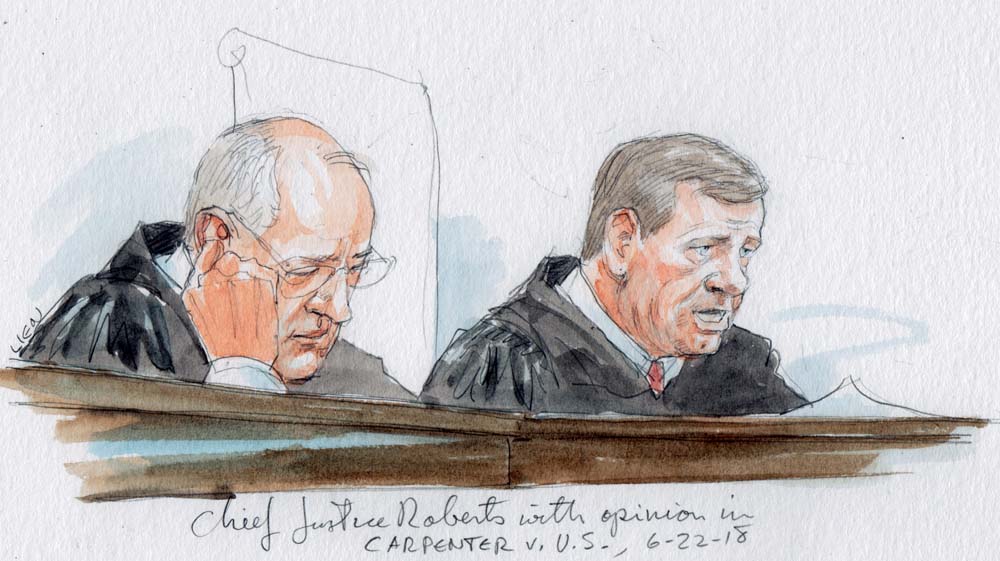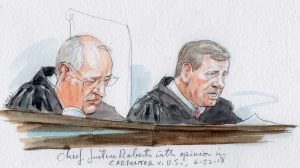Opinion analysis: Court holds that police will generally need a warrant for sustained cellphone location information (Updated)

on Jun 22, 2018 at 6:01 pm

[NOTE: This post, originally published at 11:26 a.m., was updated with additional analysis at 2:11 p.m.]
Over 40 years ago, the Supreme Court outlined what has come to be known as the “third-party doctrine” – the idea that the Fourth Amendment does not protect records or information that someone voluntarily shares with someone or something else. Today the Supreme Court ruled that, despite this doctrine, police will generally need to get a warrant to obtain cell-site location information, a record of the cell towers (or other sites) with which a cellphone connected. In an opinion by Chief Justice John Roberts, the five-justice majority pointed to “seismic shifts in digital technology,” which have allowed wireless carriers to collect “deeply revealing” information about cellphone owners that should be protected by the Constitution. Roberts characterized the ruling as a narrow one; indeed, the majority at least left open the prospect that police might not need a warrant to get information about where someone was on the day that a crime was committed. But the decision still drew sharp criticism from the dissenting justices, who complained that it is likely to imperil, in the words of Justice Samuel Alito, “many legitimate and valuable investigative practices on which law enforcement has rightfully come to rely.”
The issue came to the Supreme Court in the case of Timothy Carpenter, who was convicted and sentenced to almost 116 years in prison for his role in a series of armed robberies in Ohio and Michigan. Law-enforcement officials used cell-site records from his cellphone provider to place him in the vicinity of the crimes, but Carpenter argued that the jury should not hear about those records because the government had not obtained a warrant for them. A federal appeals court upheld his conviction, explaining that the government was not required to seek a warrant because Carpenter could not have expected cellphone records maintained by his service provider to remain private. This morning the Supreme Court reversed that ruling.
In a decision joined by Justices Ruth Bader Ginsburg, Stephen Breyer, Sonia Sotomayor and Elena Kagan, Roberts characterized the case as involving two, potentially conflicting lines of the Supreme Court’s precedent. The first involves whether someone like Carpenter can expect to have his whereabouts kept private. Roberts acknowledged that in some of its decisions predating the digital era, the court had ruled that a driver should not expect his movements on public roads to be kept private. But, Roberts stressed, times have changed. People would not expect police to track their every movement over long periods of time, but that is exactly what the cell-site location records here do. Indeed, Roberts suggested, because people carry their phones virtually everywhere with them, cell-site location records provide the government with “near perfect surveillance, as if it had attached an ankle monitor to the phone’s user” – not only going forward but also going back up to five years.
The second line of precedent, Roberts continued, is the third-party doctrine. But this is not exactly, Roberts emphasized, a “garden-variety request for information from a third party” because of the “seismic shifts in digital technology that made possible the tracking of not only Carpenter’s location but also everyone else’s, not for a short period but for years and years.” When the Supreme Court decided the cases establishing the doctrine, he explained, it was dealing with relatively “limited types of personal information”; no one could have envisioned that cellphones would be so ubiquitous and provide so much information about their users for so long. And, he added, because cellphones are such a pervasive part of life “that carrying one is indispensable to participation in modern society,” it can’t really be said that a cellphone user is voluntarily sharing information about his location with his carrier – another rationale for the third-party doctrine. Because of the “unique nature” of cell-site location information, Roberts concluded, the third-party doctrine does not apply, and the acquisition of the cell-site location records was a search within the meaning of the Fourth Amendment, for which the government would generally have to obtain a warrant.
Roberts emphasized that today’s ruling “is a narrow one” that applies only to historical cell-site location records. He took pains to point out that the ruling did not “express a view on” other privacy issues, such as obtaining cell-site location records in real time, or getting information about all of the phones that connected to a particular tower at a particular time. He acknowledged that law-enforcement officials might sometimes still be able to obtain cell-site location records without a warrant – for example, to deal with emergencies such as “bomb threats, active shootings, and child abductions.” And in a footnote, he also left open the possibility that law-enforcement officials might not need a warrant to obtain cell-site location records for a shorter period of time than the seven days at issue in Carpenter’s case – which might allow them to get information about where someone was on the day of a crime, for example. But what law-enforcement officials do not have, he wrote in closing, is “unrestricted access to a wireless carrier’s database of” cell-site location information.
Justice Anthony Kennedy dissented from today’s ruling, in an opinion that was joined by Alito and Justice Clarence Thomas. Kennedy conceded that “the Cyber Age has vast potential both to expand and restrict individual freedoms in dimensions not contemplated in earlier times.” But he rejected the idea that cell-site location information should be treated any differently than other kinds of business records that can be obtained under the third-party doctrine: Carpenter should not have had any expectation of privacy in his records because he doesn’t own or control them. In its holding to the contrary, Kennedy lamented, the Supreme Court has disconnected its Fourth Amendment doctrine from its focus on property rights, creating “an unprincipled and unworkable line between cell-site records on the one hand and financial and telephonic records on the other.” As a result, Kennedy posited, police “can acquire a record of every credit card purchase and phone call a person makes over months or years without upsetting a legitimate expectation of privacy,” but they need a warrant to get a week’s worth of cell-site records “in order to determine whether a person was within several hundred city blocks of a crime scene.”
Alito filed a lengthy dissent, joined by Thomas, in which he stressed that, as originally understood, the Fourth Amendment would not have applied at all to the methods that law-enforcement officials use to obtain documents. Alito predicted that today’s ruling will lead to one of two outcomes, both of which he regarded as undesirable: Either the decision will apply broadly to all kinds of documents containing personal information, or the court will have to admit that the ruling is “subject to all sorts of qualifications and limitations that have not yet been discovered,” creating “a crazy quilt of the Fourth Amendment.” Alito suggested that the court should have instead deferred to Congress’ judgment, in legislation known as the Stored Communications Act, that police do not need a warrant in cases like Carpenter’s. And he warned ominously that “some of the greatest threats to individual privacy may come” not from the government, but instead from “powerful private companies that collect and sometimes misuse vast quantities of data about the lives of ordinary Americans.” “If today’s decision encourages the public to think that this Court can protect them from this looming threat to their privacy,” Alito concluded, “the decision will mislead as well as disrupt.”
In addition to joining Alito’s dissent, Thomas also wrote alone to suggest that the court should reconsider its use of the “reasonable expectation of privacy” test, complaining that it “has no basis in the text or history of the Fourth Amendment.” But the most interesting separate dissent of the day came from Justice Neil Gorsuch, who specifically agreed with what he described as the majority’s “implicit but unmistakable conclusion that the rationale” for the third-party doctrine is wrong. Gorsuch would scrap both the third-party doctrine and the “reasonable expectation of privacy” test and focus instead on whether someone has a property interest (even if not a complete one) in the records at issue. But here, he pointed out, the court does not have any information on this question, because Carpenter didn’t make this argument in the lower courts.
Citing Justice Felix Frankfurter, Roberts observed that, “when considering new innovations,” the Supreme Court should “tread carefully” “to ensure that we do not embarrass the future.” Today’s ruling gives significant Fourth Amendment protection to cell-site location information, but it sheds less light on how or whether the Fourth Amendment protects other types of information in the digital era. To the extent that they haven’t already, those issues are likely to surface in the lower courts soon and will almost certainly make their way to the Supreme Court as well.
This post was originally published at Howe on the Court.



